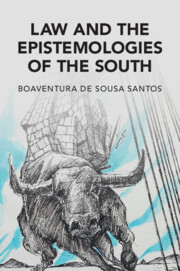Book contents
- Law and the Epistemologies of the South
- CAMBRIDGE STUDIES IN LAW AND SOCIETY
- Law and the Epistemologies of the South
- Copyright page
- Contents
- Preface
- Abbreviations
- Part One The Tragic Optimism of the Law: THE END OF A STORY
- Part Two Epistemologies of the South and the Law
- Five Introducing the Epistemologies of the South
- Six The Epistemologies of the South and Law: Towards a Post-Abyssal Law
- Seven Is Post-Abyssal Law Possible?
- Part Three The Abyssal Law under the Mode of Abyssal Exclusion
- Part Four Real Legal Utopias: Interrupting the State
- Part Five Real Legal Utopias: Interrupting the Law
- Part Six Real Legal Utopias: Interrupting Hegemonic Human Rights
- References
- Index
- Cambridge Studies in Law and Society
Seven - Is Post-Abyssal Law Possible?
from Part Two - Epistemologies of the South and the Law
Published online by Cambridge University Press: 07 August 2023
- Law and the Epistemologies of the South
- CAMBRIDGE STUDIES IN LAW AND SOCIETY
- Law and the Epistemologies of the South
- Copyright page
- Contents
- Preface
- Abbreviations
- Part One The Tragic Optimism of the Law: THE END OF A STORY
- Part Two Epistemologies of the South and the Law
- Five Introducing the Epistemologies of the South
- Six The Epistemologies of the South and Law: Towards a Post-Abyssal Law
- Seven Is Post-Abyssal Law Possible?
- Part Three The Abyssal Law under the Mode of Abyssal Exclusion
- Part Four Real Legal Utopias: Interrupting the State
- Part Five Real Legal Utopias: Interrupting the Law
- Part Six Real Legal Utopias: Interrupting Hegemonic Human Rights
- References
- Index
- Cambridge Studies in Law and Society
Summary
Modern law is abyssal law, meaning that there is a law of the oppressors and a law of the oppressed. The abyssal line both produces (and is a product of) the incommensurability between the two social orders and the invisibility of this duality. From the point of view of the epistemologies of the South, modern law operates as a juridical barbarism that remains invisible due to the false universality of the legal order of metropolitan sociability (regulation/emancipation). Contemporary theories of justice are as abyssal as the law they found. They rely on fictions that take the absence of the abyssal line to be reality. Their universality is as false as the universality of metropolitan sociability. Post-abyssal law is possible, on condition that the regulation/emancipation and appropriation/violence duality is overcome and, with it, the coexistence of the law of the oppressors and the law of the oppressed. In sum, post-abyssal law is possible once the abyssal line has been eliminated. In keeping with the preceding analysis, this will only be possible if capitalism, colonialism, and patriarchy vanish as modes of domination and are not replaced by other, milder or harsher, modes of domination. This conception refers to a theoretical possibility, but is it a real-life possibility? Can we imagine such a society or the social struggles that would accomplish it? What would this society look like?
Keywords
- Type
- Chapter
- Information
- Law and the Epistemologies of the South , pp. 158 - 202Publisher: Cambridge University PressPrint publication year: 2023

